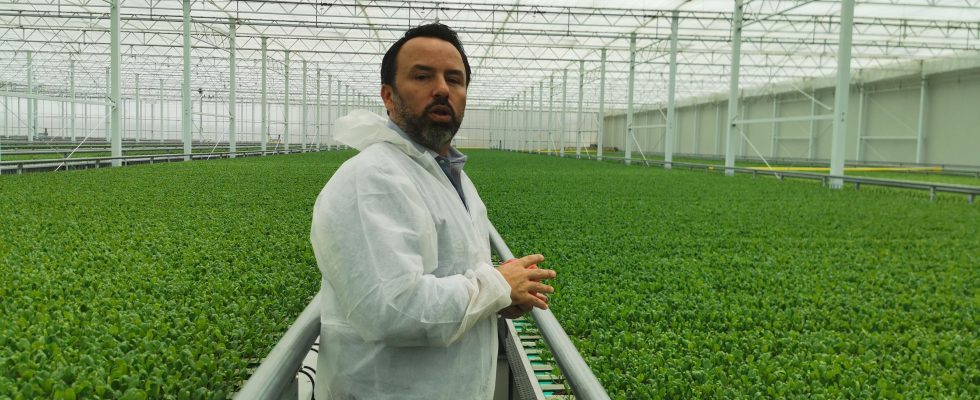“We want to be the best producers on the planet. And that’s not greenwashing.” Fitted shirt, impeccable smile, Sky Kurtz, the boss of the company Pure Harvest, has the well-oiled speech of the most promising start-ups. An environment he knows perfectly. A few years ago, this graduate of Stanford (United States) invested in the capital of unlisted innovative companies in San Francisco. Now, he produces soilless fruits and vegetables in a giant vertical farm, located in Abu Dhabi.
On the table in front of us, tomatoes, melons, peppers, salad, shiny and colorful strawberries… A real stall of vegetables. The fruits and vegetables that we are presented with, however, grew on the other side of the glass, in a huge greenhouse protected from the region’s arid climate. “Here, we have perfect control of the environment. We are already capable of producing around thirty varieties of tomatoes. Soon we will also grow eggplants and cucumbers,” specifies the entrepreneur. Thanks to its large size and its know-how aimed at optimizing energy and water, Pure Harvest can produce four million kilos of products each year which are then distributed to supermarkets in the Emirates (Waitrose, Spinneys, Carrefour) .
But the boss of Pure Harvest does not intend to stop there. His ambition? Become the world number one in the production of fresh fruit and vegetables above ground, like Apple in its time on the smartphone market. “There is a place to be taken. No international brand yet exists in this market segment,” confirms Sky Kurtz. And the expert recalls how food sovereignty is becoming a real subject for many countries. “The UAE imports around 85% of its food resources. The tomatoes we find here mainly come from Europe. If we look at things more globally, we see that the population of the Earth is expected to reach around 9.5 billion population by 2050, which will require a 70% increase in food production. This problem does not affect everyone equally. Population growth will be strongest in areas like the Middle East , Asia and Africa, already heavily dependent on imports.”
A few kilometers away, in the offices of the investment agency ADIO, whose aim is to encourage the establishment of innovative companies in Abu Dhabi, Haitham Hasan al-Subaihi, the executive director, confirms the importance of the problem. “Food sovereignty is part of the COP 28 program,” he assures. The opportunity for the Emirates to offer solutions to the most vulnerable countries. Researchers at the Dubai International Center for Biosaline Agriculture (ICBA), for example, are closely studying the plants best adapted to soils that are too salty or exposed to drought, such as quinoa or samphire. With already concrete programs that can be used in the field. And for countries where growing outdoors becomes too complicated, there are Pure Harvest’s giant greenhouses. Or cloud seeding, a geoengineering technology that Abu Dhabi is already offering to other countries, to reduce water shortages.
“If we can grow fruits and vegetables here, in the middle of the desert, it’s because we can do it anywhere,” exclaims Sky Kurtz. After a first phase of development in the Emirates and significant fundraising ($180 million), the entrepreneur is now looking internationally: “We have a project under construction in Singapore. We are also in discussions with Korea , Malaysia, Mexico to set up our facilities there.”
Certainly, vertical farms remain very energy and water intensive. “Per square meter, we consume a lot, recognizes the entrepreneur. But per kilogram of food produced, we do much better than traditional agriculture. As a result, even targeting a premium segment, we are 60 to 70% cheaper than an imported product!” In the major cities of the Emirates, many residents have already adopted cherry tomatoes grown by Pure Harvest, which is aiming for a market share of 15 to 25% over time. But Sky Kurtz is already thinking about the next step. Set up a salmon farm in the middle of the desert thanks to the experience acquired with Pure Harvest. The project is a bit crazy. But it will undoubtedly make some investors dream.
